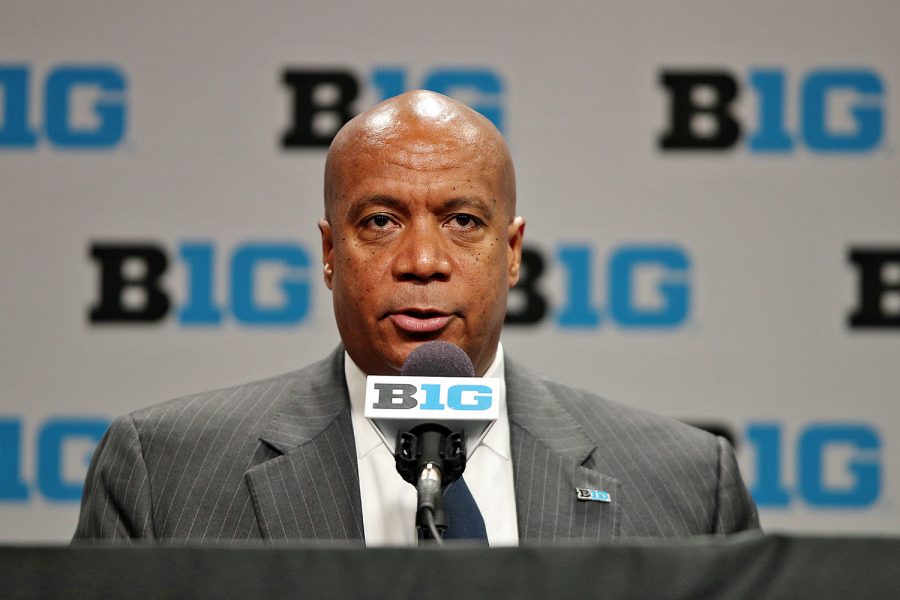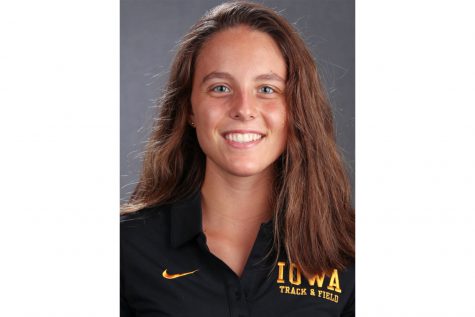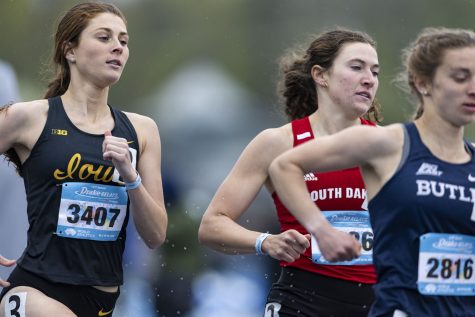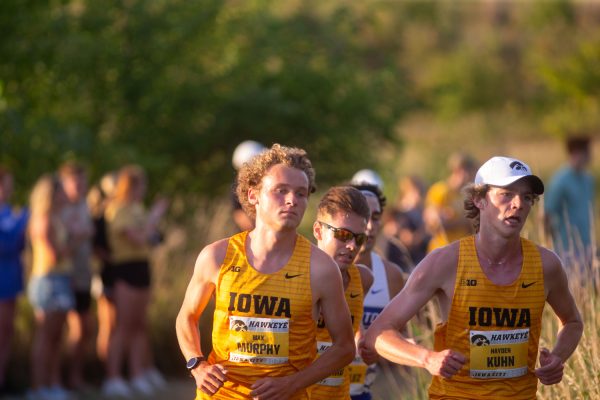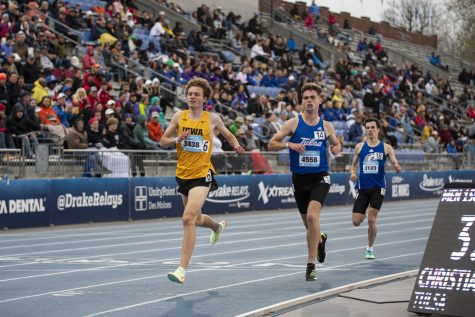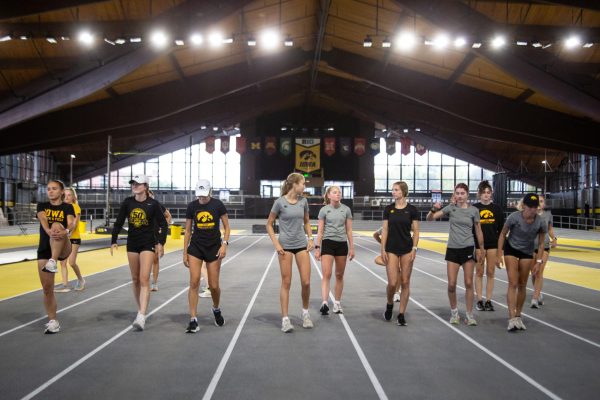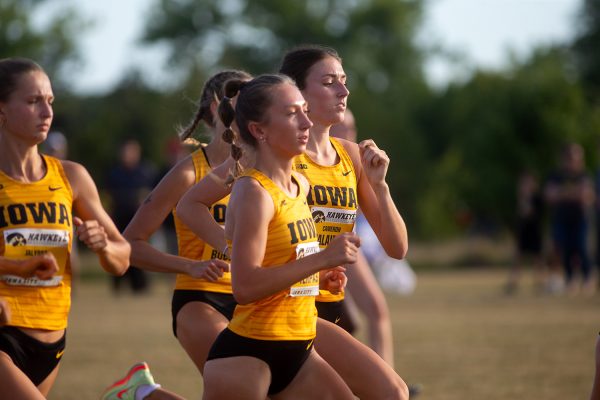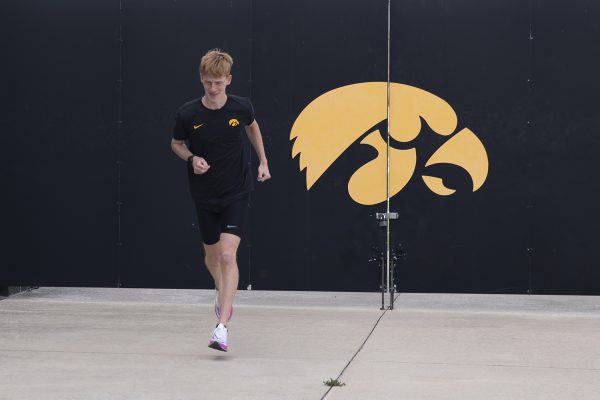Big Ten Conference releases COVID-19 medical protocols
Big Ten athletes will be required to be tested for COVID-19 at least once weekly.
Big Ten Conference Commissioner Kevin Warren addresses reporters regarding the cancellation of the 2020 Big Ten men's basketball tournament at Bankers Life Fieldhouse in Indianapolis, on Thursday, March 12, 2020.
August 5, 2020
Along with its new 2020 football schedule, the Big Ten announced the conference’s COVID-19 medical protocols Wednesday morning.
The protocols were jointly authored by the Big Ten Task Force for Emerging Infectious Diseases and the Big Ten Sports Medicine Committee in an effort to mitigate risk as the conference seeks to resume athletic competitions. The protocols are intended to guide institutions in the minimum necessary requirements needed to participate in Big Ten athletics during the 2020-21 academic year.
“Developing consistent medical protocols and testing procedures for the health and safety of our student-athletes and our athletic programs is critical,” Big Ten Commissioner Kevin Warren said in a release. “… With the knowledge we have today, providing potential options for all of our student-athletes was of the utmost importance to us, all while ensuring there is a process in place to incorporate student-athlete feedback. While a comprehensive plan has been developed, we also know it is essential to continue to be agile as new information and health trends become available and we will adjust accordingly.”
Testing will be managed by an undisclosed third-party laboratory to “ensure consistency across the conference.”
COVID-19 testing protocols in the conference include:
- All sports will be required to test a minimum of once weekly, while sports with high contact risk will be required to test a minimum of twice weekly.
- Required testing frequency is based upon the level of contact risk within the sport and is required for student-athletes as well as coaches and additional staff members.
- The required testing, at this time, for COVID-19 must use polymerase chain reaction (PCR) testing.
- Institutions may supplement the required conference testing with additional testing performed for surveillance or clinical purposes.
Testing prior to accessing athletic facilities upon initial arrival to campus is required by the Big Ten, as is a symptom questionnaire before entering facilities on a daily basis.
RELATED: Iowa football opens season at home Sept. 5 against Maryland as part of updated Big Ten schedule
The Big Ten is requiring testing for student-athletes, coaches, and staff within three days of competition for sports with one game in a week. For sports with multiple competitions in a week, testing will be done within three days of the first of the week’s competitions. Results of testing must be shared among the competing schools prior to game time.
For confirmed cases that arise after the competition is completed, information is required to be shared with the previous week’s opponents, if applicable, to facilitate contact racing at the opponent’s institution.
Game officials for sports where six feet of physical distancing cannot be maintained must also be tested weekly.
The classifications of contact risk level by sports, according to the Big Ten, is as follows:
- High: football, basketball, cheerleading, field hockey, lacrosse, rowing, soccer, water polo, wrestling, and volleyball.
- Intermediate: Baseball, softball, gymnastics, cross country, and beach volleyball.
- Low: Golf, fencing, rifle, swimming & diving, tennis, track & field, and bowling.
Decisions based on who and when to test for out-of-season sports is left to the discretion of each institution.
In addition to routine surveillance and pre-competitions testing, if student-athletes or staff develop COVID-19 symptoms at any point, the Big Ten is requiring a clinical evaluation, which may include COVID-19 testing.
RELATED: New Big Ten football schedule structured to ‘maximize flexibility’
Along with testing protocols, the Big Ten also released COVID-19 quarantine and isolation protocols:
- After a positive COVID-19 test or if an infection is suspected, 14 days of quarantine are required per current national guidelines, without the ability to test out of quarantine.
- Return to play after a close contact is allowable if no symptoms develop while quarantined and the individual has quarantined the required time.
- Prolonged close contact is defined by greater than 15 minutes within six feet by the Center for Disease Control.
- An individual suspected to be infected will be isolated and if testing subsequently reveals the individual is positive for the virus, close contacts are required to me immediately quarantined.
- For cases that arise after precompetition testing but before competition begins, the individual is required to be promptly isolated and contact traced. If testing subsequently reveals the individual is positive for the virus, close contacts are required to be immediately quarantined prior to competition and the individual placed in isolation.
- For cases that arise during competition, the individual needs to be promptly isolated, and that information is required to be shared with the current opponent to aid in decisions about how to proceed with that competition. If testing subsequently reveals the individual is positive for the virus, close contacts are required to be immediately quarantined and the individual placed in isolation.
- For confirmed cases that arise after competition is completed, the individual is required to be promptly isolated and contact traced to quarantine close contacts. Information is required to be shared with the previous week’s opponent, if applicable, to facilitate contact tracing at the opponent’s institution.
For individuals who have tested positive:
- Asymptomatic Infection
- Isolate for at least 10 days from the positive test (20 days if severely immunocompromised according to CDC criteria). If the student-athlete or staff member becomes symptomatic, revert to recommendations below.
- Cardiac workup based on current guidelines.
- Must be cleared by team physician prior to return.
- Reacclimatization to physical exertion based on current guidelines.
- Treatment and return to activity will require collaboration with health care providers.
- Symptomatic Infection
- Infected individuals with mild to moderate illnesses who are not severely immunocompromised must be isolated for at least 10 days from onset of symptoms and at least 1 day (24 hours) has passed since recovery, defined as resolution of fever without the use of fever-reducing medications and improvement of respiratory symptoms (e.g., cough, shortness of breath) in accordance with current CDC guidance. For severe illnesses or severely immunocompromised individuals regardless of illness severity, the isolation period should be extended to 20 days from the onset of symptoms and at least 1 day (24 hours) since recovery.
- Cardiac workup based on current guidelines.
- Must be cleared by team physician prior to return.
- Reacclimatization to physical exertion based on current guidelines.
- Treatment and return to activity will require collaboration with health care providers.
“We continue to face uncertain and unprecedented times, and the health, safety and wellness of our student-athletes, coaches, staff, and others associated with our sports programs remains our number one priority,” Iowa Athletic Director Gary Barta said in a release. “I am confident in the medical protocols established by the Big Ten Conference Task Force for Emerging Infectious Diseases and Sports Medicine Committee, in addition to the continued oversight provided by our UI Hawkeye team physicians within the UIHC Department of Orthopedics and Epidemiology.
“The past few months have entailed numerous conversations between my conference colleagues, Commissioner Kevin Warren and our Big Ten presidents, as we have worked to navigate the challenges associated with this pandemic. We appreciate the continued patience and support from our donors, ticket holders, partners, and fans. Now that the football schedule has been announced, we will finalize our Kinnick Stadium seating plan and share that in the next few days. If we have the opportunity to play, we are excited about our challenging conference schedule and the five games in Kinnick Stadium.”
These protocols will go into effect at the start of the competitive season and complement local protocols already in place at the institutional level.
The Big Ten said Wednesday that these protocols will be updated periodically as more information becomes available.



